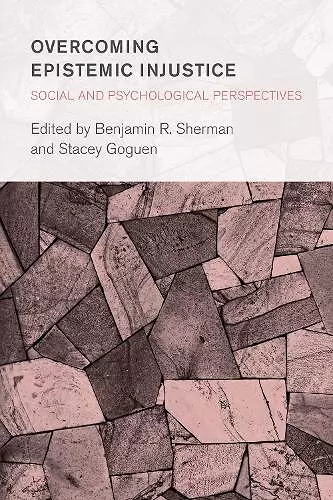Overcoming Epistemic Injustice
Social and Psychological Perspectives
Benjamin R Sherman editor Stacey Goguen editor
Format:Paperback
Publisher:Rowman & Littlefield International
Published:15th Jul '19
Currently unavailable, and unfortunately no date known when it will be back

Prejudice influences people’s thoughts and behaviors in many ways; it can lead people to underestimate others’ credibility, to read anger or hysteria into their words, or to expect knowledge and truth to ‘sound’ a certain way—or to come from a certain type of person. These biases and mistakes can have a big effect on everything from an institutional culture to an individual’s self-understanding. These kinds of intellectual harms are known as epistemic injustice. Most people are opposed to unfair prejudices (at least in principle), and no one wants to make avoidable mistakes. But research in the social sciences reveals a disturbing truth: Even people who intend to be fair-minded and unprejudiced are influenced by unconscious biases and stereotypes. We may sincerely want to be epistemically just, but we frequently fail, and simply thinking harder about it will not fix the problem. The essays collected in this volume draw from cutting-edge social science research and detailed case studies, to suggest how we can better tackle our unconscious reactions and institutional biases, to help ameliorate epistemic injustice. The volume concludes with an afterward by Miranda Fricker, who catalyzed recent scholarship on epistemic injustice, reflecting on these new lines of research and potential future directions to explore.
Overcoming Epistemic Injustice is a unique and valuable contribution. It brings philosophical questions to bear on how to combat epistemic injustice, and how to do so in specific contexts: in healthcare, the legal and correctional systems, education and academia, and sports. Daring, empirically-grounded, and solutions-oriented, it is a model for scholarship in pursuit of justice. -- Michael Brownstein, Associate Professor of Philosophy, John Jay College of Criminal Justice, City University of New York
One of the most pressing issues for addressing the complex intersections between oppression and forms of epistemic injustice is how such forms of injustice can be effectively resisted and ultimately overcome. Overcoming Epistemic Injustice augments current research by focusing on case studies of institutional structures that perpetuate epistemic harms. From medical and mental health institutions to the criminal justice system to the academy to implicit bias research, the authors of this distinctive collection offer insights regarding complex circulations of power and knowledge that provide resources for challenging such structures. -- Nancy Tuana, DuPont/Class of 1949 Professor of Philosophy, Penn State University
ISBN: 9781786607065
Dimensions: 219mm x 151mm x 23mm
Weight: 481g
334 pages